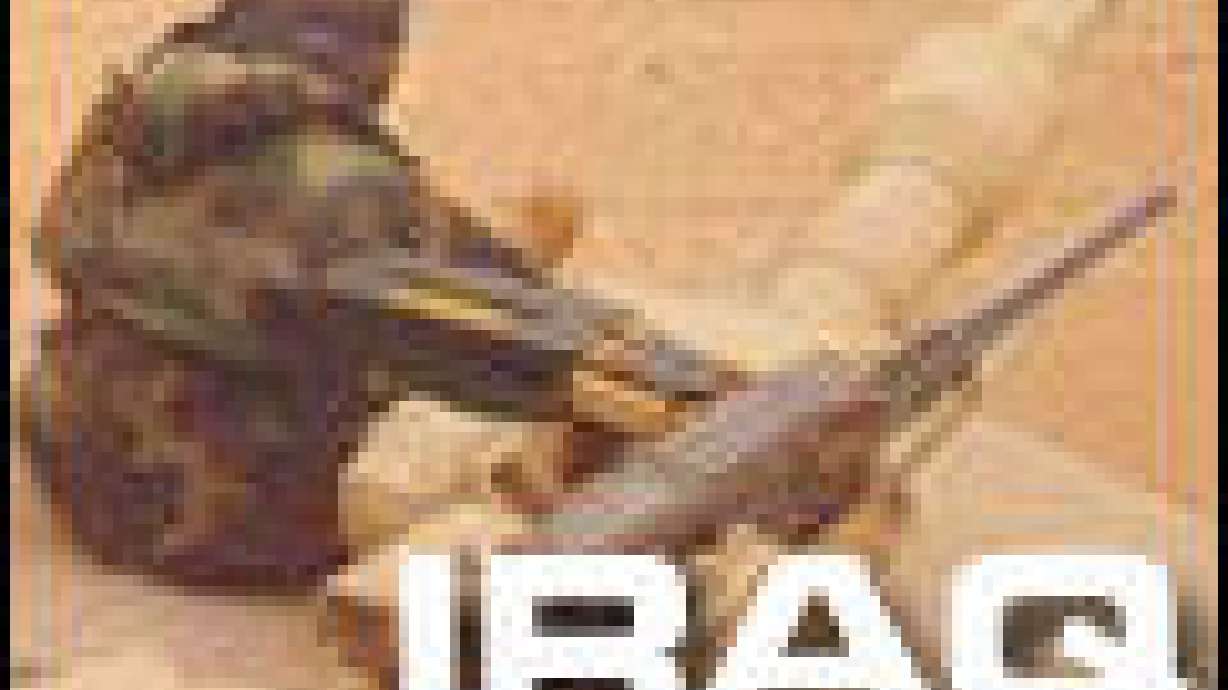Estimated read time: 5-6 minutes
This archived news story is available only for your personal, non-commercial use. Information in the story may be outdated or superseded by additional information. Reading or replaying the story in its archived form does not constitute a republication of the story.
BAGHDAD, Iraq (AP) -- Iraq's cascade of violence claimed more American lives, with a bomb attack on a military convoy killing one U.S. soldier Monday and gunmen slaying another in an ambush on a patrol in the capital.
Three American soldiers have been killed in attacks in Baghdad in a 24-hour period. Four other U.S. soldiers were wounded in a grenade attack on their convoy in the restive town of Ramadi west of Baghdad.
Early Monday, insurgents threw a homemade bomb at a U.S. convoy in northern Baghdad, killing a soldier, said Sgt. Patrick Compton, a spokesman for the military.
The night before, two gunmen ambushed a platoon in the Adhamiyah neighborhood of northern Baghdad, and in the firefight that followed an American was killed, a military statement said.
"Soldiers pursued the attackers and during an ensuing firefight, the soldier was killed. One gunman was killed and the other wounded," the statement said.
Earlier Sunday a U.S. soldier shot in the head at close range as he waited to buy a soft drink at Baghdad University.
With ambushes, shootings and bombings taking place daily -- blamed on Saddam Hussein loyalists and other disgruntled Iraqis -- 30 American soldiers have been killed by hostile action since President Bush declared major combat over on May 1.
Also, in northern Iraq, U.S. forces on Sunday released 11 Turkish special forces detained last week, the Turkish military said, ending a diplomatic standoff between the two NATO allies.
In Ramadi, 60 miles west of Baghdad, attackers fired a rocket-propelled grenade on a U.S. convoy late Sunday, wounding four American soldiers, the military said. One Iraqi suspect was killed and another wounded.
Tension has increased in the town since a bomb blast on Saturday killed seven Iraqi police recruits as they graduated from a U.S.-taught training course. Dozens more were injured.
The U.S. military blamed the attack on pro-Saddam Hussein insurgents seeking to target those working with the Americans, but many in Ramadi said they thought the Americans themselves were behind the incident.
Ramadi, one of several Sunni-majority towns along the Euphrates River west of Baghdad, was a stronghold of support for Saddam, and has been the site of frequent attacks that have killed Americans as well as Iraqis.
Both of the American soldiers killed in convoy attacks in Baghdad were from the Army's 1st Armored Division, the Germany-based division which is charged with occupying the Iraqi capital.
The killing of the U.S. soldier waiting to buy a soft drink Sunday was similar to the slaying of a young British freelance cameraman, who was shot in the head outside a Baghdad museum on Saturday.
The death of the cameraman and a grenade attack on a U.N. compound raised concern that Iraq's worsening insurgency -- until now targeting only coalition troops and Iraqis accused of U.S. collaboration -- will spread to Westerners in general.
U.S. troops on patrol in Baghdad and other areas have been attacked several times a day, and Iraqi police and civilians perceived to be working with the occupying forces also have been targeted.
U.S. Army Maj. William Thurmond said it was too early to tell whether a pattern was emerging that would suggest insurgents are targeting foreign civilians, but he said such a strategy could thwart news gathering and humanitarian relief efforts.
"Hopefully they're isolated events and we won't have to face them in the future," Thurmond said. "It might work to the advantage of someone who's trying to fight the coalition."
The killing of the television cameraman, 24-year-old Richard Wild, occurred around midday, while the victim was carrying no apparent sign that he was a reporter.
Wild, who arrived in the country two weeks ago aiming to be a war correspondent, was killed by a single pistol shot fired into the base of his skull from close range, colleagues said. The assailant fled into the crowd and was not apprehended.
In a similar incident, an assailant with a pistol shot and critically injured a U.S. soldier in the neck on June 27 as he shopped on a Baghdad street.
The release of the Turkish special forces came after Turkish Prime Minister Recep Tayyip Erdogan spoke to Vice President Dick Cheney for about half an hour on the phone Sunday.
The soldiers -- and 13 Iraqi staff and security guards who were also held -- were returned to their office in the northern city of Sulaymaniyah by helicopter Monday, Anatolia reported.
U.S. troops from the 173rd Airborne took the Turkish forces in custody Friday in Sulaymaniyah over an alleged plot to harm Iraqi Kurdish civilian officials in the north. Turkey has denied any such plot.
The detentions outraged Turkey, deepened the Turkish public's mistrust of the United States, and strained efforts to repair relations soured over the Iraq war.
Gen. Hilmi Ozkok, the chief of military staff, said the detentions "created the biggest crisis of confidence between the
Turkish and U.S. armed forces." In other news:
-- An Australian NBC News sound engineer, Jeremy Little, died Sunday at a military hospital in Germany from complications following surgery for wounds he suffered June 29 in a grenade attack in Fallujah, NBC News said. Little, 27, was wounded when insurgents fired a rocket-propelled grenade at the military vehicle in which he was riding.
-- The military announced the end of a seven-day sweep dubbed Sidewinder, in which 30 Iraqis were killed and 282 detained, while 28 U.S. soldiers were wounded. The military said it confiscated ammunition stocks and hundreds of weapons.
(Copyright 2003 by The Associated Press. All Rights Reserved.)









